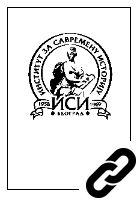2. Naučni članci
-

-
Materinsko udruženje - humani i socijalni aspekti delovanja 1904-1941.
-
Socijalna politika u Kneževini i Kraljevini Srbiji nije bila regulisana na državnom nivou, već je staranje o napuštenoj deci, nemoćnima i starima bilo briga opštinskih i okružnih vlasti. Prvo privremeno prihvatilište za decu – ratnu siročad stvoreno je posle srpsko-turskih ratova 1877, ali je briga o ovoj deci vrlo brzo prešla u ruke Ženskog društva. Još jedan dom je osnovan
1881. godine, ali su u njega primana deca starija od pet godina. Najveći procenat smrtnosti dece je bio upravo u grupi odojčadi i dece do 5 godine, pa je zato stvaranje Materinskog udruženja 1904. godine predstavljalo prekretnicu u zdravstvenoj i socijalnoj nezi i zbrinjavanju napuštene dece i siročadi. Zahvaljujući posvećenom radu prve predsednice udruženja Sare Karamarković i potpredsednice dr Drage Ljočić, rezultati su bili vidljivi već u prvim godinama delovanja., Social politics of Principality and Kingdom of Serbia was not organized on a state level, as there was no ministry nor even a department which would systematically tackle any social issues. The care for the poor, the sick and the abandoned was reduced to single acts of mercy, however the municipalities were obliged to take care of abandoned children. The founding of the Maternity Society on the 4th December 1904 marked a beginning of organized care for young, abandoned children. The purpose of this society was to establish a hygienic
home for infants and children up to the age of 7 where they could bring up those deprived of parental care. The participation of almost all of Belgrade’s women doctors – dr Draga Ljočić, dr Marija Zibold, dr Ljubica Gođevac, dr Marija Vučetić, dr Marija Savić, provided necessary healthcare to these children. With the significant engagement of Maternity Society’s members and
collection of financial resources, they managed to establish the first Home for Foundlings in 1905/06 and maintain it for many years with great help from state authorities.
The purpose-built Home for Infants, populated in 1925, was well equipped and fulfilled the hygienic and medical regulations. In the beginning, the medical staff consisted of volunteer doctors with constant help from trained Society’s members, although later it also included permanently employed doctors and nurses. The Home turned into a modern, functional institution where
they brought many foreign state, diplomatic and professional delegations in order to present this form of social help in the best light. Other significant aspects of the Maternity Society were raising social awareness on women’s position in Serbian society. Breaking social stereotypes, they bravely fought for changing certain acts of the Civil law. Special attention was given to the most neglected social groups – the poor and single mothers, cast out from their families and the entire society. Society’s members helped them in hardest times – after they’ve given birth, often hiring them in the Home as wet nurses or helping them find jobs and accommodation. Although the work of these societies was limited to Belgrade territory, by taking care of abandoned and cast out children, their members did the greatest act of kindness – saving innocent lives., Published, Šifra projekta: 47030, Rad je deo projekta Konflikti i krize: saradnja i razvoj u Srbiji i regionu u 19. i 20. veku (47030) koji finansira Ministarstvo prosvete, nauke i tehnološkog razvoja Republike Srbije.

